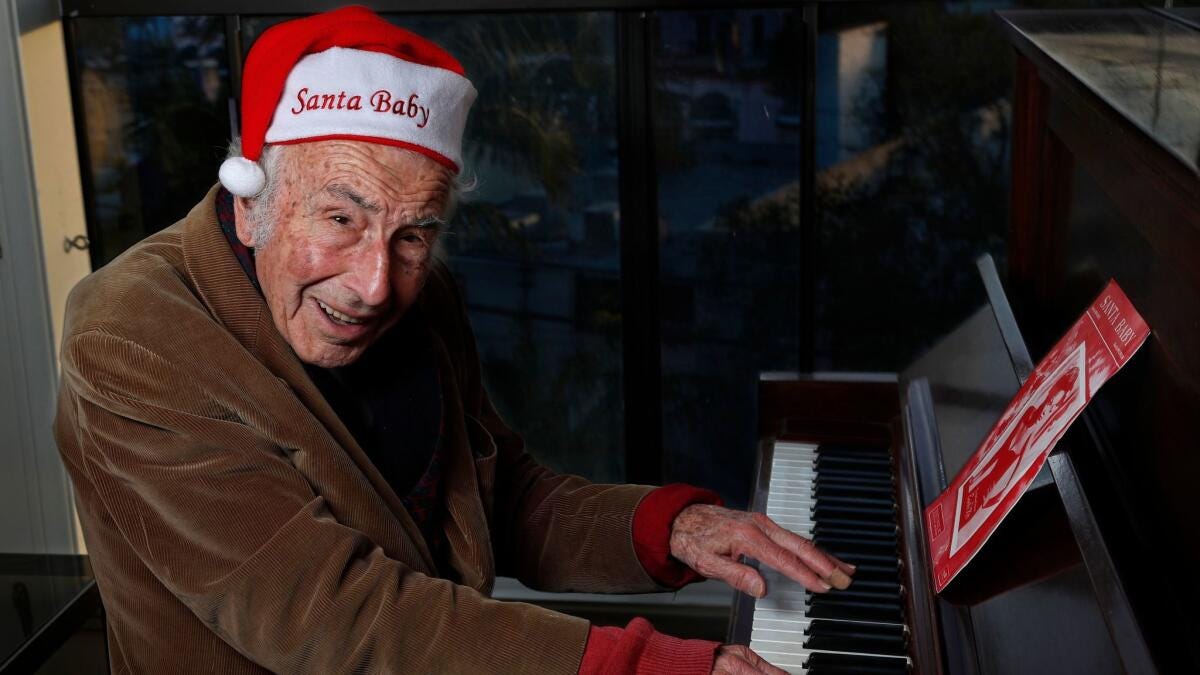More Than Santa Baby: A Conversation with Philip Springer
For most people, writing a Christmas classic would define their career. For Philip Springer, it's just a small piece to the puzzle
If you read anything about musician Philip Springer, you’ll come to learn that he wrote “Santa Baby,” one of the most popular Christmas songs of all-time. But if you only focus on that holiday classic, you wouldn’t realize how much other stuff Springer has done in his nine decades. He wrote songs for Frank Sinatra and Elvis Presley. He scored movies and television shows. He even earned his PhD in music with a focus on early synthesizers. Last week, I got to catch up with the 98-year-old Springer about his long career.
If you enjoy our conversation, follow Springer on Instagram to keep up with news about More Than Santa Baby, a forthcoming documentary about his career. It is due out in 2025.
I know you’ve told this story many times, but, for the sake of the readers here, can you give me the cliff notes on how “Santa Baby” came to be?
In 1953, my writing partner Joan Javits and I were commissioned to write a Christmas song for Eartha Kitt. At that time Eartha was the sexiest emerging star in America. I said, “That's impossible! How can one write a Christmas song for a sex symbol?” Joan and I were sitting in a meeting room with the publishers, and Joan came up with the title “Santa Baby.” Everyone loved it. Joan and I went to my apartment in New York City and started working on the song. It took about three weeks to finish it. The rest is history.
Over the years, everybody from Michael Bublé to Taylor Swift to Madonna has recorded “Santa Baby.” Do you have a favorite rendition?
While I appreciate all of the superstars that have recorded “Santa Baby,” Eartha Kitt's original version is my favorite. She was a unique and powerful performer. The song was literally made for her.
By the time you wrote “Santa Baby,” you had been making music for years. Can you tell me a bit about how you first got into music?
My mother was a concert pianist. She played quite beautifully, and I appreciated that as early as six years old. I just loved to hear her play. She got me into music.
Did you start playing as a child?
Yes. When I was six, I learned to play a little bit of Bach’s Fugue in D minor by ear. Now I’m 98 and am studying the entire piece. I work on it ever morning.
What does it mean when you are “studying” a piece? Are you practicing at the piano? Diagramming the music? Something else?
I am not at the piano when I study. I sit in my living room chair and just read the music. From there, I am able to memorize it and then play it from memory. But sometimes I will study a piece for months before actually playing it.
In your mind, is studying the piece the same as playing it? What is going on in your mind?
It’s not the same. It’s hard to say exactly what is going on in my mind, except that when I finish studying a piece, I can play it.

A moment ago, you were talking about Bach. What fascinates me about your career is that while you were classically trained, you also wrote popular songs. Does your approach change when you are working in the classical or jazz world as opposed to the pop world?
It’s the same approach. When I write a song, I am taking all of my knowledge and using it together. I can’t divorce my academic career from my commercial career. They are one in the same.
Over the years, you’ve had many famous singers interpret your songs. Frank Sinatra. Elvis Presley. Dusty Springfield. Was there one particular artist that you could not believe was actually singing one of your pieces?



